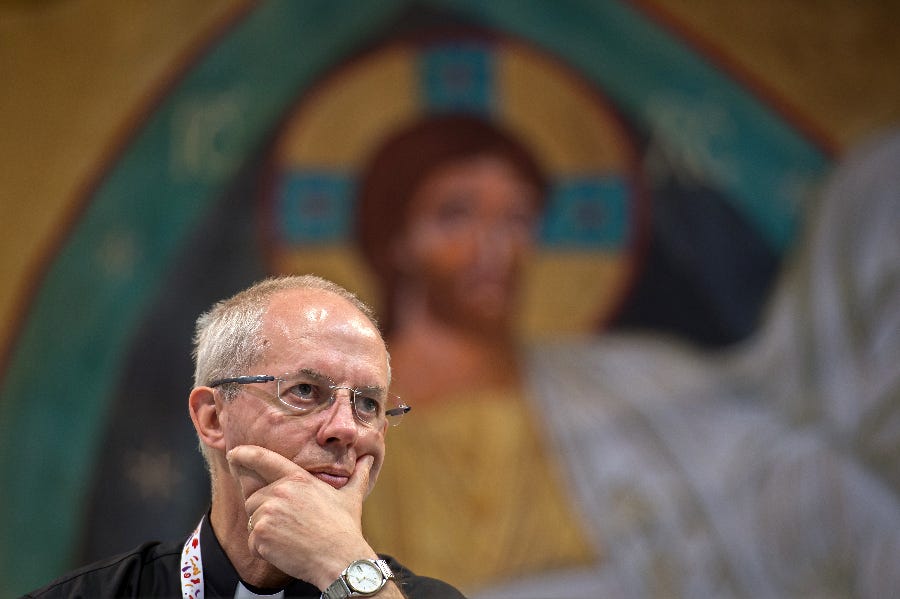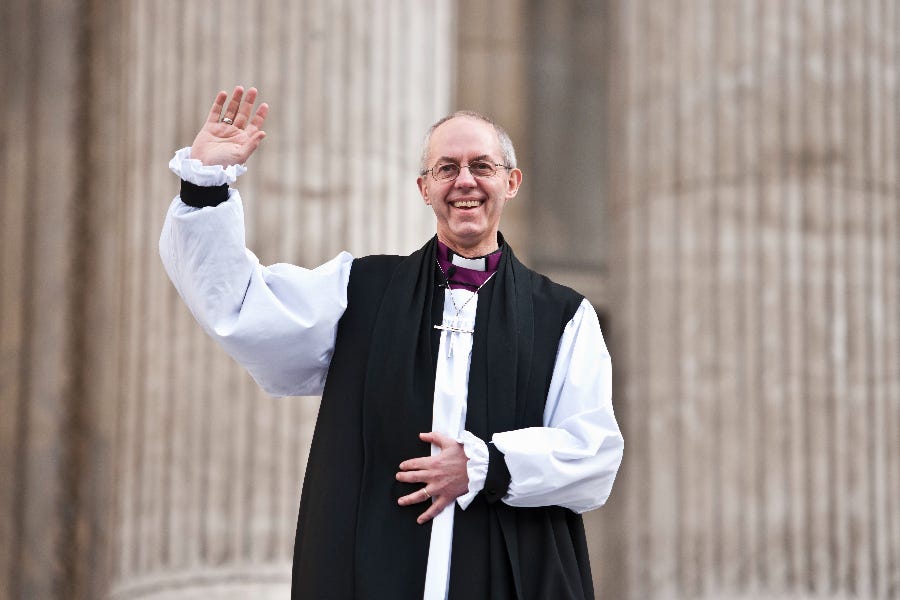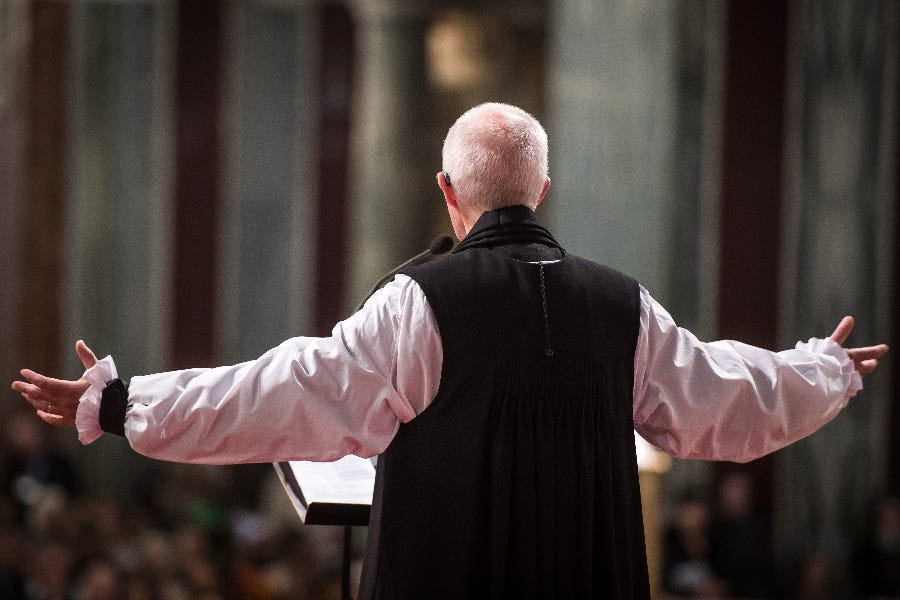
Why is the Archbishop of Canterbury under pressure to resign?
The Church of England's leader is under fire over what he knew, and when, about the denomination's most prolific abuser
The spiritual leader of the world’s 85 million Anglicans is facing intense pressure to resign over his handling of an abuse case.

The Archbishop of Canterbury Justin Welby said Nov. 7 that he had considered resigning after an independent report concluded that Anglican authorities had covered up serial sexual abuse by John Smyth, a lawyer who volunteered at U.K. Christian summer camps in the 1970s and 80s.
The report, known as the Makin review, described Smyth as “an appalling abuser of children and young men.”
It said that recipients of a 1982 report detailing the abuse “participated in an active cover-up to prevent that report and its findings — including that crimes had been committed — coming to light.”
Smyth, a lay reader in the Church of England, died in South Africa in 2018 while under police investigation.
Welby, who has led the Anglican Church of England since 2013, is mentioned almost 150 times in the report. What does the review say and why are there increasing calls for the Archbishop of Canterbury to step aside?

Wait, who’s Welby?
Justin Welby, a former oil industry executive, was selected in 2013 as the Archbishop of Canterbury, succeeding Rowan Williams. He formally took up the role on March 21, 2013, just two days after Pope Francis’ inauguration.
Welby is officially the 105th Archbishop of Canterbury, counting back to St. Augustine of Canterbury. The see was in full communion with the pope from its inception until the 16th-century English Reformation.
In addition to leading the Anglican Diocese of Canterbury, the archbishop is the Primate of All England, indicating his senior position in the Church of England, the country’s established church.
The Archbishop of Canterbury is also the first among equals among primates of the Anglican Communion, the world’s third-largest Christian body after the Catholic Church and Orthodox Church. But in practice, he has little authority over the Anglican Communion’s other member churches.
The Church of England says it is “committed to safeguarding as an integral part of its ministry and mission.” It has three “lead safeguarding bishops”, a steering group responsible for national safeguarding strategy, and a national safeguarding team.
The Independent Inquiry into Child Sexual Abuse (IICSA) said in a 2020 report that the Church of England’s main insurer handled 217 child abuse claims between 2003 and 2018. It argued that “the culture of the Church of England facilitated it becoming a place where abusers could hide.”
“Culture change is assisted by senior Church leaders now saying the right things, but lasting change will require more than platitudes,” it said. “It will need continuous reinforcement of the abhorrent nature of child sexual abuse and the importance of safeguarding in all of the Church’s settings.”

What does the report say?
In 2019, the Church of England’s national safeguarding team commissioned a review of the handling of abuse allegations against John Smyth (pronounced “Smythe”).
The review was initially due to be published in 2020, but repeatedly delayed. The 251-page report was finally published Nov. 7.
The review described Smyth as arguably “the most prolific serial abuser to be associated with the Church of England.” It said he had subjected “at least 115 and possibly as many as 130 boys and young men” to physical, sexual, psychological, and spiritual abuse in three countries from 1971 until his death in 2018.
One child, it noted, “died in suspicious circumstances at one of Smyth’s camps in Zimbabwe.”
Smyth moved to Zimbabwe in 1984, two years after a secret report detailing his abuse was presented to Church of England figures. He relocated to South Africa in 2001.
The report estimated that Smyth abused 26 to 30 boys and young men in the U.K. in the 1970s and 1980s, and a further 85 to 100 in Africa.
The review said: “There is clear evidence that the abuse perpetrated by John Smyth in the U.K. were ‘covered up,’ minimized and held as ‘secret’ from at least 1982 (and possibly earlier), and that this cover-up applied until later in the review period.”
The review examined Welby’s connections to Smyth and his handling of the case as Archbishop of Canterbury.
It noted that Welby had attended summer camps where Smyth served as a volunteer in the mid-1970s, when the future Archbishop of Canterbury was in his early 20s.
A contributor to the review said Welby was overheard in 1978 having a “grave conversation” about Smyth. But the archbishop said he did not recall such a conversation and only became aware of the allegations against Smyth in 2013, four months into his tenure in Canterbury.
Welby insisted he was never close to Smyth, though he acknowledged sending him Christmas cards and making small donations to Smyth’s mission in Zimbabwe.
The review said: “[Welby] did know of John Smyth and, on balance, did have reason to have some concern about him, but that is not the same as suspecting that John Smyth had committed severe abuses. Based on this evidence, it is not possible to establish whether Justin Welby knew of the severity of the abuses in the U.K. prior to 2013.”
The report concluded that after 2013, Welby had a “personal and moral responsibility” to take further steps to “reassure himself that the matter was being pursued,” beyond simply observing the policies operative at the time.
“He was advised to not pursue this further whilst a police investigation was underway (which it wasn’t) but he should have made further attempts to reassure himself that the matter was being pursued, particularly with regard to the approach to South Africa,” the review said.
What’s Welby saying?
Welby told Channel 4 News, which confronted Smyth with the allegations in 2017, that he had given “a lot of thought for actually quite a long time” to the idea of resigning as Archbishop of Canterbury.
In a Nov. 7 interview, he said: “I’ve taken advice as recently as this morning from senior colleagues. And no, I’m not going to resign for this. If I’d known before 2013 or had grounds for suspicion, that would be a resigning matter then and now. But I didn’t.”
Yet Welby conceded that between 2013 and 2017, he “did not ensure that this was pursued as energetically, as remorselessly as it should have been.”
In the days after the interview, prominent Church of England clergy appealed for Welby to resign. A petition calling for him to go had more than 6,500 signatures at press time.
Helen-Ann Hartley, the Anglican bishop of Newcastle, told the BBC that Welby’s position was “untenable.” She is the most senior Church of England figure so far to call for his resignation.
Asked whether Welby should resign, the U.K. Prime Minister Keir Starmer said: “That’s a matter really for the church rather than for me.”
British media suggested Starmer’s refusal to endorse Welby left the archbishop “hanging by a thread.”
Welby has previously said he intends to remain in the post until 2026, when he reaches the mandatory retirement age for archbishops of Canterbury of 70.
“I will certainly take advice,” he said in 2022, “and if my health is good and people are happy that I’m still there, then I’ll still be there.”








If he does bow out, my money is that the next Archbishop of Canterbury will be one of England's female bishops.
What we need is for Good King Charles to abrogate the Act of Settlement and the Bill of Rights' clause on protestantism (both on the grounds of Inclusivity and Equity, of course), invoke his authority and disband the Church of England (which Charles already has long loathed), and then convert to Catholicism. Bada bing, bada boom.
I'm sure Ed will fully endorse my well-reasoned and highly-likely course of action.
Welby has just resigned.
https://www.bbc.co.uk/news/live/cj505ygdp17t